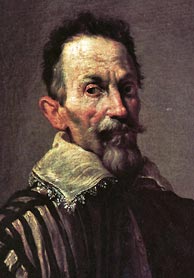

Claudio Monteverdi numbers among those rare composers who can be called “complete” because of an ability to create successfully in every style and genre of their times. Such composers include Purcell, Mozart, and Stravinsky, in my view. (Bach is not there because he didn’t write opera, though he slips a toe in the door because some operatic approaches in various works). The Boston Early Music Festival has, over the years, performed a large percentage of Monteverdi’s works, including his three surviving operas (both individually and in a single season) and a side range of both sacred and secular compositions.
On Friday night, they presented a collection of works largely from his books 7 and 8 (the first was published in 1619, when he was in his early 50s). These comprised varied selections of works sometimes called ‘madrigals” (though of different character from the Renaissance madrigals of his first six books) or “concertos” (referring to the interplay of competing soloists, both singers and instrumentalists). Most often at this period, the concertato, or “concerted” music involved two singers, usually of the same voice range, or, in instrumental music, two matched instruments—violins, oboes, or whatever.
But the opening number of this brilliant concert was for a solo voice with continuo (with instrumental ritornelli between stanzas, which, as Stephen Stubbs pointed out in his essay on the program, echoed the opening of his opera Orfeo in 1607, when the personification of Musica informed the audience of things to come.
The concert representing 1619 and the years shortly after featured the Boston Early Music Festival Vocal Ensemble (soprano Teresa Wakin, countertenor Reginald Mobley, tenors Jason McStoots and Aaron Sheehan, and bass-baritone Jonathan Woody). As befits the repertory of this particular period of Monteverdi’s work, they mostly sang in solo or as duos. The BEMF Chamber Ensemble (Robert Mealy and Cynthia Roberts; violins; Sarah Darling, viola; Laura Jeppesen, viola da gamba, David Morris, violoncello and lirone; Maxine Eilander, Baroque harp; Michael Sponseller, harpsichord; Paul O’Dette, chittarone, and Stephen Stubbs, chitarrone) similarly sorted themselves into various guises for the different pieces.
In addition to the vocal works of Monteverdi, the stream included two sonatas (No. 3 and 11) by Monteverdi’s colleagues at the basilica of St. Mark’s during the 160, Dario Castello, from a publication entitles Sonata concertate in stil modern (Sonatas concerted in the modern style, which, as with the vocal pieces that are “concerted,” call competitive performances by duos).
Aaron Sheehan opened with the thematic song, Tempro la cetra (“I tune the lyre”), an extensive poetic discussion of the oppositions of love and war. The theme of love as a kind of warfare appears already in the early Renaissance, but Monteverdi’s seventh and eighth books make it both dramatic and explicit. Each of the eleven poetic stanzas offers opportunity for vocal display, also hinting at amorous passion or military conquest with instrumental ritornelli between sections.
A solo song of sweetly lyrical character (Ego flos campi – “I am the rose of Sharon”) comes from a book of Monteverdi’s “sacred songs”: it was sung with great delicacy by Reginald Mobley. The two tenors, Jason McStoots and Aaron Sheeham represented the “concerted” style in Interrotte speranze (“Hopes cut short”) in which the two singers express the unhappy reactions of a love denied in what could be called a rising close-harmony combat as the singers’ voices twist and turn around one another in the same way through three-quarters of the sonnet test. Only in the last three lines do they burst forth with aspersions at the cruel woman who is the cause of this torment. In a context like this, the two linked voices take on the atmosphere of a single lover whose tormented moods fight among themselves.
Ongi amante Guerrier (“Every lover is a warrior”) breaks away, to a degree, from the pattern of duo by dividing the extensive poem of Ottavio Rinuccini into a section for two tenors, then one for solo bass, and all three singers join at the end. Bass-baritone Jonathan Woody joins his dark voice to that of the two tenors
After all the male voices, it was a pleasure to get the respite of a soprano voice, Teresa Wakim, singing a song by Francesca Caccini, the daughter of Giulio Caccini ,one of the creators of the earliest operas in Florence. A distinguished singer, Francesca also surpassed her father as a composer. (BEMF will present her chamber opera Alcina in two years.) The song, Maria, dolce Maria, is a sweetly passionate song of sacred intensity.
The last two selections were favorites selected from Monteverdi’s 1632 publication Scherzi musicali (“Musical Jests”). The title suggests nothing along the lines of stand-up comedy, but rather, playful treatments of the game of love. They show Monteverdi’s range, especially in comparison with the “battles of love” implied at the outset of the concert.
In the final “scherzo”, the brilliant tenor duet over an ostinato in the bass sets up a rolling dance rhythm and an eight-note repeated phrase, over which the tenors sing a sonnet by Rinuccini celebrating the delights of spring: Zefiro torna (“Zephyr [the warm summer wind] returns”). As it unfolds, the poem speaks of every lovely image of the season of fair weather, all of them suitably mirrored in Monteverdi’s music. Suddenly, though, the dance stops and the tenor voices and the instrumental bass discourse a tormented harmony: “Only I wander in torment…the fire in two lovely eyes torments me.” But at the very end, the unhappy lover yields to fate: “Sometimes I weep…[dance rhythm returns] sometimes I sing!”
It is hard to imagine a work by Monteverdi that could more perfectly serve as the closer to these intense reactions of love.
Steven Ledbetter is a freelance writer and lecturer on music. He got his BA from Pomona College and PhD from NYU in Musicology. He taught at Dartmouth College in the 1970s, then became program annotator at the Boston Symphony Orchestra from 1979 to 1997.


